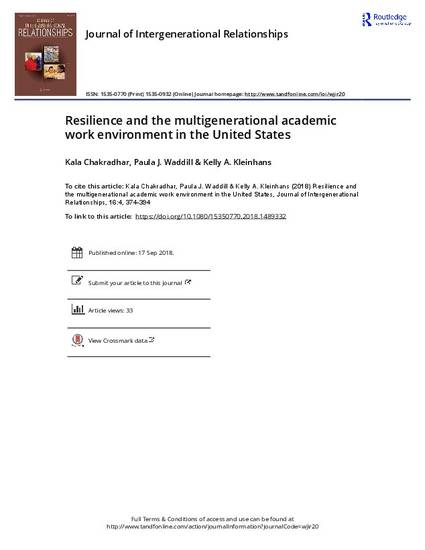
Article
Resilience and the multigenerational academic work environment in the United States
Journal of Intergenerational Relationships
(2018)
Abstract
The academic work environment in higher education has transformed and evolved, not only with respect to the goals pursued and the means to accomplish these goals, but also with respect to its demographic composition. Four generational cohorts with some unique dispositions defining their work ethic and adaptation to the work environment constitute the current workforce. These changes highlighted the need to examine the resilience of this pluralistic workforce. This empirical research study of faculty (n = 484) in a stratified sample of universities in the United States investigated what is it that contributes to resilience across the generational cohorts when working in the environs of an academic workplace. The Copenhagen Psychosocial Questionnaire II and the Resilience Quotient Tool were used to assess generation-specific perceptions of the work environment and adaptation, respectively. Separate stepwise regression analyses on each generational group revealed different sets of environmental variables significantly contributing to total resilience in each generational group. The results of this study demonstrate similarities and differences in resilient dispositions of these four generations that the higher education institution should capitalize on to enhance productivity and employee satisfaction.
Keywords
- academia,
- academic employment,
- multigenerational work environment,
- resilience
Disciplines
Publication Date
Fall September 17, 2018
DOI
https://doi.org/10.1080/15350770.2018.1489332
Citation Information
Kala Chakradhar. "Resilience and the multigenerational academic work environment in the United States" Journal of Intergenerational Relationships Vol. 16 Iss. 4 (2018) p. 374 - 394 ISSN: 1535-0932 Available at: http://works.bepress.com/kala-chakradhar/14/
